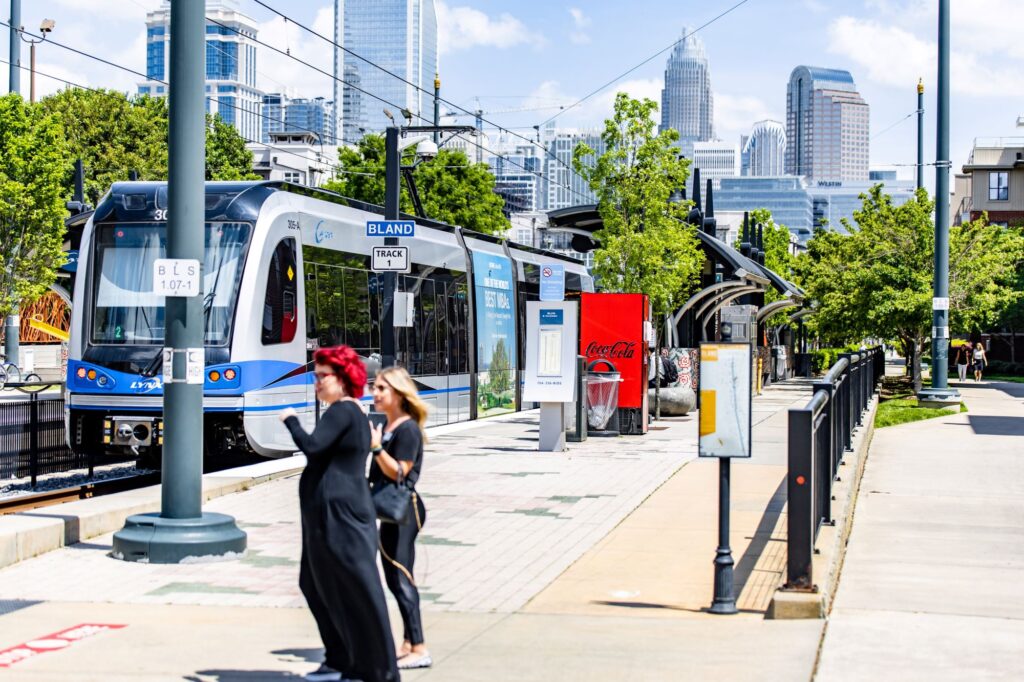Metropolitan Transit Commission: the latest
There has been a lot of news coming from CATS recently. We attended the recent Metropolitan Transit Commission meeting on Wednesday, Mar. 22 to hear the latest from interim CATS CEO Brent Cagle.
The meeting opened with Mayor Lyles expressing the need for a “candid conversation” about the May 2022 Lynx Blue Line derailment that came to light a few weeks ago. Cagle then delivered a CATS Management Partners Update presentation, outlining the successes of the department, including steady bus and rail operations and a stable budget.
What happened
Cagle explained the cause of the May 2022 derailment, which occurred months prior to Cagle joining CATS as interim CEO in December 2022, and the steps that CATS and NCDOT have taken up to this point. In short, a bearing on a light rail vehicle became corroded and caused the axle to seize. The wheel could then no longer turn and the light rail train came to a stop. Passengers were unloaded and taken to their destinations. Nobody was hurt and the inoperable vehicle was taken out of service.
Per industry regulations, CATS alerted NCDOT to the derailment within 2 hours of the event and the two departments have been working together since. However, Cagle did not learn of the derailment until Feb. 6, 2023 when NCDOT sent a notice to CATS expressing additional concerns about the faulty bearings.
As it turns out, nearly every light rail vehicle is overdue for maintenance on the bearings. CATS is in the process of sending eight vehicles at a time to California for maintenance overhauls with a projected completion date for the entire fleet of mid-2025. Cagle said he and CATS staff have been out to California to work with Siemens, the light rail company, to encourage a faster timeline for these urgently needed repairs.
CATS is implementing mitigating measures to ensure the safety and reliability of the Blue Line. These measures include reducing the speed from 45 mph to 35 mph and placing heat strips, which indicate if a problem with the bearing is developing, on each vehicle. These heat strips are a recommendation from Siemens, are approved by NCDOT, and will be inspected each week. At no time has the Federal Transit Administration or NCDOT suggested that CATS needs to suspend services.
Cagle clarified that the faulty bearings are out of warranty and are a result of deferred maintenance. The city will now have to foot the $30 million cost of repairs. He also shared a memo with MTC members about lapses in required inspections for 37 “elevated surfaces” (many of which are bridges) and six parking garages. The last round of inspections in 2019 rated all elevated surfaces as “fair” or “good” condition and found only one urgent repair that was addressed immediately. The elevated surfaces were slated for inspection again in 2021, but the inspections did not take place. Now that the delay has come to light, CATS will immediately hire a contractor to complete the overdue inspections.
What’s next
Understandably, each MTC member expressed deep concern about the lack of transparency from CATS and the safety of the light rail. Commissioner Leigh Altman brought a resolution to the commission to hire a third party consultant to review CATS as soon as possible. The motion passed, and legal counsel will determine if City Council needs to approve funding of the review before moving forward.
The overwhelming response from MTC members was one of shock and broken trust. Commission members were disheartened to have learned about the derailment 10 months after the incident and to have received detailed information not from CATS, but from the media. There was a unified call for CATS to develop a culture of trust, accountability, and transparency within the department and with the MTC to prevent future incidents and respond appropriately when incidents do occur.
Interim CATS Chief Financial Officer Chad Howell also gave an update on the department’s revenue and operating expenses.
Now that the union representing bus drivers has negotiated a new agreement with their management company, CATS will focus on retaining drivers so that reliability of bus service remains high. Currently only 1%-2% of all trips are missed.
Our take
We agree with the Transit Services Advisory Committee representatives that it is essential for CATS to restore more frequent bus service as soon as possible, which will require retaining drivers and recruiting new ones. When service is both reliable and frequent, more people will choose to ride transit instead of drive.
People need to know that transit is safe in order to feel comfortable riding. The news about the derailment, deferred maintenance of vehicles, and overdue inspections of elevated structures is very concerning. We appreciate Cagle’s efforts to address the problems that existed at CATS when he took on his role as interim CEO, and look forward to the outcome of the third-party review to inform a healthy future for CATS.
Thanks for reading
As a nonprofit, community support is essential for us to keep doing what we do — including providing free articles like this. If you found this article helpful, please consider supporting Sustain Charlotte so we can continue advocating for a better future and working with residents, neighborhood organizations, government agencies, nonprofits, and businesses to solve the most critical challenges to Charlotte’s long-term social, economic, and environmental health.
Want to stay in the loop? Subscribe to our free, weekly newsletter and follow us on Twitter, Facebook, and Instagram.

